11 August 2016
Trieste
A city of spies.
By Chin Chin
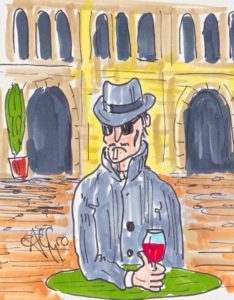
Churchill is often credited with saying that “the Balkans produce more history than they can consume locally” but the phrase was actually turned, or at least first turned, in relation to the people of Crete by the brilliant short story writer, Saki. Still, there is a special magic about the Balkans, with their chaotic history of spying, revolutions and assassinations, and its glow lights up the Italian city of Trieste, the gateway to that intriguing area which lies to its east.
Trieste may be Italian now but it has been many other things before. It was Roman, of course, and a Roman theatre stands on the street so there is no need to pay to go to see it. Then the proximity to Venice secured it a role as a possession of the Most Serene Republic; later, following the abolition of the Venetian state by Napoleon, it became part of the Austro-Hungarian Empire, up until the First World War. The bedroom doors of the Grand Hotel Duchi D’Aosta bear the double-headed eagle of the Habsburgs in acknowledgement of the building’s nineteenth century origins. And even now, despite a period as a free city under the protection of the allies between 1947 and 1954, and despite its subsequent incorporation into Italy, the varying loyalties of its people reflect the tensions traditional to the area. The custodian at one of the local sites, an affable and courteous man, told me that he feels more Austrian than Italian and that he believes that the radical activist Beppe Grillo, who leads the Five Star Party, is the only untainted Italian politician. There are many who think the same. Perhaps, then, the fires of Balkan conflict are damped rather than wholly extinguished.
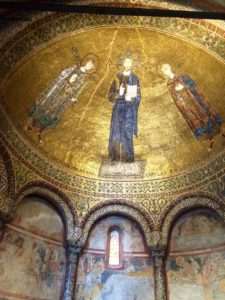
So what do you expect to find in a city like this? A grand square with cafes serving espresso in the sun on each side of it? Indeed, they are there. The fact that one of them is called “Harry’s Bar” is another nod to Venice, although the magnificent Victorian buildings of the square itself cannot compete with those of St Mark’s for antiquity. Well then, what about walks and churches? The Basilica di San Giusto with its Byzantine mosaics is well worth the walk up to the castle next to which it stands. There are other magnificent churches too. But this sort of thing is to be expected in a beautiful Italian city. Here the feeling that the political tensions have not yet quite played themselves out adds another dimension. A city of spies by tradition, something of the clandestine still clings to the stones.
How do you take the temperature of such a place? How can you immerse yourself in the tensions which exist behind the attractive Italian facades? How do you enter the world of the Grillo followers, the separatists, and the secret policemen who must inevitably be trying to keep them under surveillance?
There are two possible routes. One is to immerse yourself in their world on one side or another. That means disguising yourself in the traditional garb of the cloak and dagger and waiting for adventure to come to you. A turned-up collar and a pulled-down hat are clearly de rigueur. Dark glasses too are more or less compulsory and also a way with mysterious replies.
“Will you have another glass of Spumante?” asks the ever-attentive waiter.
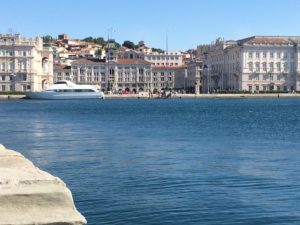
“By night all cats are grey” you reply. The waiter steps to the phone, his brows furrowed. Five minutes later, two large men with turned-up collars, pulled-down hats and bulges under their left arms sit down uninvited at your table. The question is, which side are they on? Who knows? Perhaps, though, it is as well that you didn’t buy that package labelled “bomb” from the London theatrical prop shop before you left.
Of course it doesn’t always work as well as that. Perhaps the waiter just assumes that your Italian is poor and brings you a cappuccino. Perhaps he assumes that the line about cats is an example of the famous English irony of which he has heard so much. If that is the case you need to go to plan B.
Plan B is a game played in a hotel restaurant and, for it to work, the hotel has to be the sort of establishment at which travelling diplomats, spies, and businessmen put up. No, not a Hilton or a Hyatt, but somewhere with an atmosphere of slightly faded grandeur. The Pera Palace in Istanbul was perfect before they did it up. I haven’t seen the restoration, so perhaps it still is.
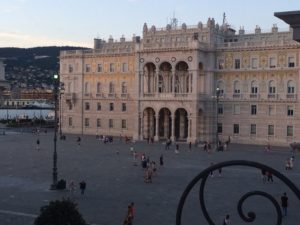
Let us assume that you are a married couple. After dinner you look round the dining room for a man eating on his own. There are several, so you select the one who looks most interesting. You then ask a waiter to take over a card inviting him to join you for coffee. As you are a married couple there are certainly no sordid implications so the likelihood is that your target will agree. Men dining on their own are often bored after dinner, and coffee with complete strangers is at least a form of entertainment.
You are now in a win-win situation. If your target turns out to be dull or unpleasant, why then, after a cup of coffee you explain that you have an early start and must retire to bed, regretting of course that you cannot take the interesting discussion on the manufacture of plastics any further. If, on the other hand, the target is entertaining and, particularly, if he comes from that part of the political undercurrent with which you hope to connect, then there is an evening of drinking and chatting to come. The fact that the conversation is in a mixture of bad English and bad Italian only adds to the atmosphere.
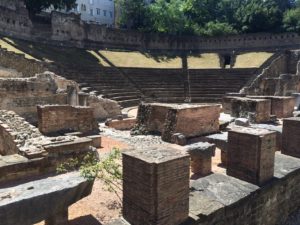
It is important, of course, not to issue your invitation before dinner or you may learn more about plastics than you actually wish to know.
Cities like Trieste form the perfect background to this sort of thing, and if the next article from Chin Chin is written from an Italian prison as charges are brought relating to espionage or, perhaps, to a foreigner who unfortunately got involved in some Italian business fraud, well then at least I will have the consolation that I played the game energetically, perhaps just not too wisely and a little too well.
If you enjoyed this article please share it using the buttons above.
Please click here if you would like a weekly email on publication of the Shaw Sheet

